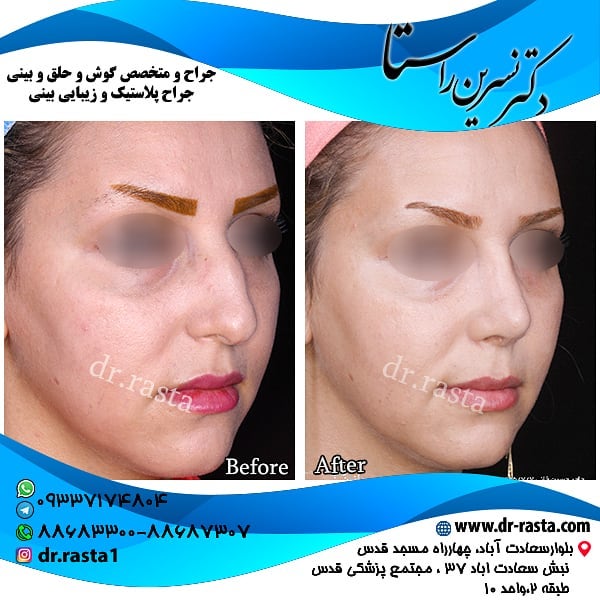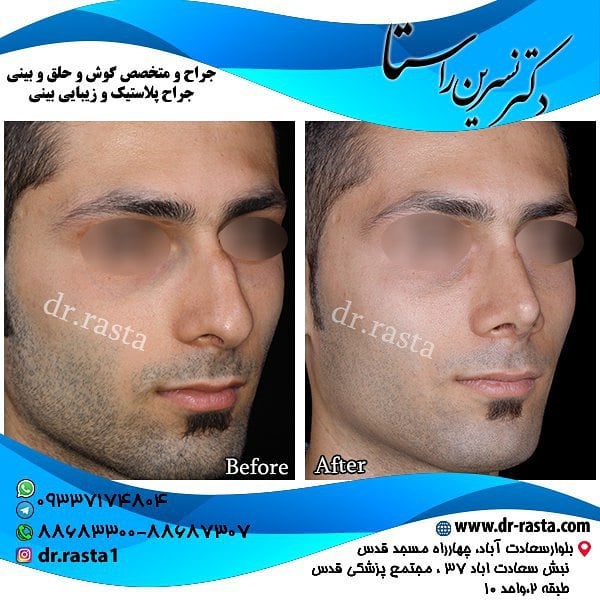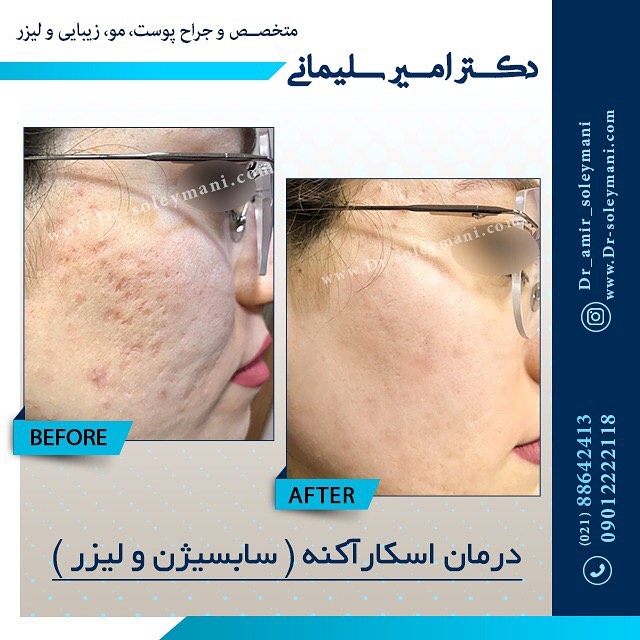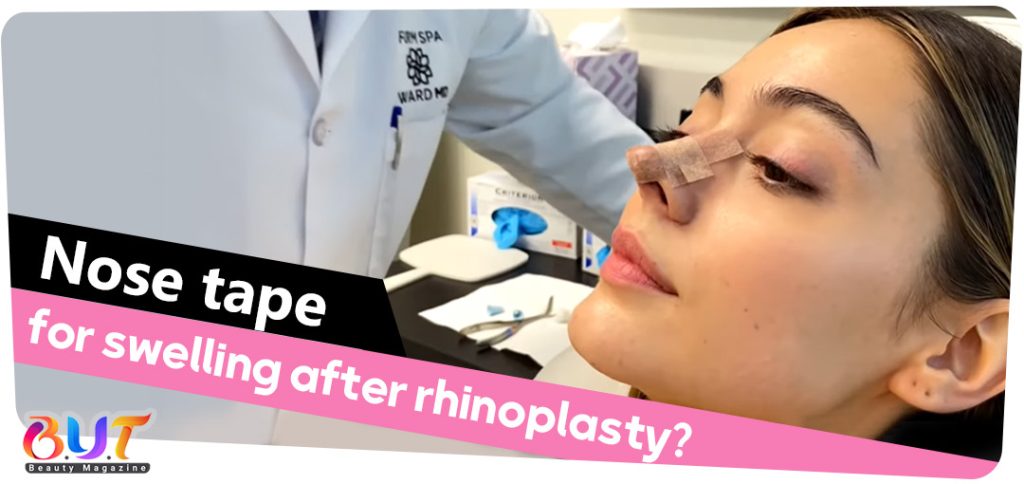Skin Care Consultation after rhinoplasty with Dr. Rasta & Dr. Soleymani

The topic of our discussion is complementary skin treatments in rhinoplasty. We are in the service of Dr. Soleimani, a dermatologist and hair specialist. This field is closely related to rhinoplasty.
Introduction of Dr. Rasta and Dr. Soleymani
Dr. Nasrin Rasta. Otolaryngologist Head & Neck Surgeon.
Specific board in the field of Otolaryngologist Head & Neck Surgeon
Academic member of European Association of Plastic Surgeons
Website: dr-rasta.com
Free rhinoplasty consultation with Dr. Rasta by Direct link and number +9891988683300 on WhatsApp.
Dr. Amir Soleymani .
Hair dermatologist
Member of the medical staff of the University of Tehran
Instagram page: @dr_amir_soleymani
Free rhinoplasty consultation with Dr. Soleymani by Direct link and number +989012222118 on WhatsApp.


Using Accutane before rhinoplasty (Isotretinoin)
Dr. Soleimani, the first is about taking isotretinoin capsules (Accutane). Can Rhinoplasty be performed while taking Accutane? If not, why not? And how long do you have to wait between stopping Accutane and having a nose job?

According to available skin references, Accutane should be discontinued two months before rhinoplasty. There are differing opinions about postoperatively, skin references allow the use of Accutane 2 to 4 months after surgery, while theoretical surgical articles suggest otherwise.
As a surgeon, give your opinion on the use of Accutane after surgery.
I completely agree with you about taking Accutane before surgery because it causes problems in the healing process and even causes necrosis of the skin plate, which is difficult to heal and leaves scars.
For this reason, clients must be asked about taking Accutane and it is emphasized that they should stop taking this drug at least 2 months before the operation so that the operation can be performed more safely.


Analysis of the effects of isotretinoin on rhinoplasty patients
In the postoperative case, the presence of abundant sebaceous glands in the fleshy noses causes the skin to thicken, which retains the swelling. Also, thick skin does not show bone and cartilage well. Therefore, usually after the end of the skin repair process (about 2 months after surgery), we start taking Accutane in a period of 6 months with 3 different doses for the patient, which reduces the sebaceous glands (fat) and swelling, the nose looks more beautiful.


Fat nose return after nose surgery
Does not the skin and nose return to its previous state after stopping 6 month consumption of Accutane?
The mechanism of action of Accutane is to reduce the activity and number of sebaceous glands in the skin. Most of the facial sebaceous glands are in the nose and scalp, which is why people have oily noses. Decreasing the number of glands reduces the fat of the nose and decreases the activity of the sebaceous glands, causing the nasal tissue to shrink and the size of the nose to become smaller over time.
Taking Accutane after surgery helps reduce swelling in the nasal area. The effect of this pill for the treatment of severe skin rashes is almost permanent, but for the nose cannot be said with certainty. However, taking this pill along with the natural process of healing the nose causes the nose to shrink and the surgery to be effective, which will lead to patient satisfaction.


Accutane effect on skin healing

Many friends have asked about this, if they do not have liver problems and skin allergies (as well as not being pregnant in women up to 1.5 years after consumption) they can take this pill after the operation and get a better result from the fleshy nose surgery, which will be largely permanent.
How long will the side effects of Accutane pill stay in the body?
Waiting 1.5 years for pregnancy after taking Accutane is the most cautious and is usually prescribed in cases where a person has consumed alcohol.
But a person who has not consumed alcohol and does not have a specific disease and her test results are normal, 2 to 3 months after stopping Accutane, its effects disappear and she can get pregnant.
Liver enzyme checks and blood lipid checks, especially triglycerides, are normally performed on a person taking Accutane. This pill usually does not cause a problem for normal people except someone who has an underlying disease, in which case lower doses can be used. The only absolute prohibition against Accutane is the intention to become pregnant.
Can Accutane cause liver damage?
If enzymes increase 3-4-fold or triglycerides 7-8-fold while taking Accutane, should the pill be stopped or should the dose be reduced?
Elevated triglycerides are common while taking Accutane, and according to medical references, doubling it is not a problem (normally around 200, in which case it reaches 400) and does not even require a dose reduction. Small changes in triglyceride levels can also be prevented by changing your lifestyle, diet and activity level.
In cases where the triglyceride level reaches above the range of 700-800, it is necessary to stop taking Accutane. Dose reduction is also prescribed in cases where a person's triglyceride increases more than double. If the triglyceride level is still high after reducing the dose, we will continue to reduce the dose.
This is different in liver enzymes. Even with a 30% increase in liver enzymes, we begin to reduce the dose of Accutane. If the enzymes acid and Alt reach triple, Accutane will be stopped and another medicine will replace it.
After 6 months and checking liver enzymes and triglycerides, you can start taking Accutane again.


Can I take Accutane if I have fatty liver?

If you have a fatty liver, will taking Accutane pills cause a problem or not?
Many questions are asked about fatty liver and its relationship to other diseases. Liver function is important for the administration of Accutane.
The liver enzymes that show this function are very important and cannot be limited to ultrasound alone. If a person has fatty liver due to low activity, overeating and obesity, start taking Accutane; As long as it does not directly affect liver enzymes and does not elevate them, there is no problem in consuming Accutane.
Accutane for rhinoplasty swelling

How does taking Accutane after rhinoplasty help and what effect does it have?
Accutane is recommended for patients with sebaceous skin or so-called fleshy nose and thick skin. When bone and cartilage are formed in rhinoplasty, think of it as a sculpture with a thin cloth on it. Naturally, the arches and protrusions of the sculpture and its shape are much more visible. On the other hand, if a very thick cloth is thrown on the statue, many parts and protrusions of the statue will not be seen and will disappear, and it will show even more width of the statue.
The same is true of the nose; in rhinoplasty, the nasal bone is narrowed and new beauty lines (aesthetic lines) are defined. When the surface of the sebaceous skin comes on the nasal bone, it is added to twice the thickness of the skin to the width of the nose and unfortunately does not show the full result of the operation; that is why Accutane is given to the patient. This pill reduces the width of the skin, reducing the width of the nose and gives you the desired result from the front view.
Also in the area of the nose protrusion from the side view, due to the reduction of skin thickness; reduces the protrusion of the nose and brings a more ideal nose.
Thank you so much. So in fact, reducing the thickness of the skin due to the shrinkage of the sebaceous glands, makes the skin thinner and shows nasal surgery much better.
Yes, that is quite right.


Popping pimples after rhinoplasty
In some patients, after 1-2 months of rhinoplasty, small pimples appear on the face, forehead and nose. We sometimes attribute this to anesthesia, the wrong taping, or not getting the full fat of the skin before taping and closing the pores. What do you think is the reason for this?
After closing an area, especially a fatty area such as the nose, acne is quite common and normal.
Prolonged closure of the nose with a tape or bandage, despite the care and caution of patients, causes the pores to close and fat to accumulate, which eventually becomes infected and acne develops.
Patients should rinse the nasal area thoroughly with a suitable material when changing the tape and do not apply the tape to the nose for longer than recommended by the surgeon.
In case of acne or if you need to stick your nose for a long time, oral antibiotics should be taken in consultation with a dermatologist and an ENT specialist to prevent acne infection.



The right time and how to change the dressing on different types of noses
According to the nose surgeon, what is the appropriate time to have a nose dressing and taping on the face? And how often should a change be made? Is it possible to tape the nose alone at home? Or should I go to the clinic?
The duration of nose taping for bony noses is about 1 to 2 months, for fleshy noses 2 months in full (night and day) and in the third month only taping the noses is required at night.

Normally, the tape change should be done between 2 and 3 days, which in very oily fleshy noses, sometimes need to be changed daily. This can usually be done by the patient or patient's Accompany. Since the tip of the nose (U-shaped) is very important and can change the shape of the tip of the nose in the long run, it is recommended that patient's Accompany who has more control over the nose to apply the tape carefully and with paying attention to the shape of the tip of the nose.
Of course, if the patient lived alone, he can apply tape in front of the mirror by bending his head and looking in the direction of the tip of his nose.
what happens if you don't tape your nose after rhinoplasty?
Unfortunately, some patients, due to high obsession and impatience to reduce swelling and progress in the healing process, apply more and nose tape for a long time, which causes the mentioned problems, including acne.

I strongly emphasize that the nose tape should not be applied for more than the time stated by the surgeon. Nose tapping do not help to shape the nose, but if made incorrectly, they can ruin the shape created by the surgeon and cause the cartilage to deform.
The tape should not be pressed too hard on some parts, and the nose should be thoroughly rinsed thoroughly with soaps and solutions that remove skin oil before changing the tape.














